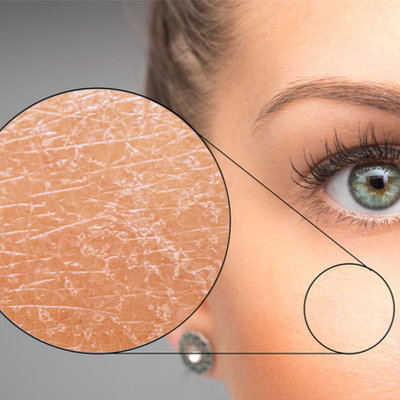 OVERVIEW
OVERVIEW
Dry skin, or xerosis, is a common skin condition that results when the skin loses moisture and its natural oils resulting in scaling, flaking, cracking, and itching. It is sometimes also referred to as xeroderma or xerosis. Dry skin affects people of any age and skin type and can occur anywhere on the body.
Normal skin has a water content that ranges from 10-15% to keep it soft and smooth. Disruption to this, due to external factors or internal factors, can lead to the development of dry skin.
What are the Common Causes of Dry Skin?
You can experience dry skin for a variety of different reasons, including:
External Factors
- Weather and climate: Exposure to the cold, low humidity, and dry indoor spaces can all lead to dry skin.
- Your occupation: People who work in jobs that require repeated hand washing or result in exposure to chemicals are more likely to have dry skin. Examples include: nurses, housekeepers, daycare workers, cooks, florists, and hairdressers.
- Lifestyle factors: Taking long hot showers or baths can dry out your skin. Similarly, many popular soaps can be harsh, stripping your skin of its natural oils.
Endogenous Factors
- Skin diseases: Patients who suffer from conditions like atopic dermatitis, psoriasis, and seborrheic dermatitis commonly have dry skin.
- Systemic disorders: People with diabetes, thyroid disease, or kidney disease may also develop dry skin as a result of their health issues. Cancer survivors and cancer patients can also develop dry skin as a result of their cancer treatments.
- Age: As we age, our skin produces less oils and we become more prone to having dry skin.
- Medications: Certain medications such as retinoids and diuretics can cause you to have dry skin.
- Diet: A lack of water intake, along with vitamin or mineral deficiencies, can lead to the onset of dry skin.
What are the Symptoms of Dry Skin?
The common symptoms of dry skin include:
- Roughness
- Scaling
- Flaking
- Peeling
- Redness
- Itchiness
- Cracks in the skin
- Pain, burning, or stinging of the skin
How is Dry Skin Treated?
Setting up an appointment with a board-certified dermatologist can help. A dermatologist can accurately diagnose your condition and recommend a treatment regimen that works just for you.
The most common treatments options that your dermatologist may recommend for dry skin include:
- Lifestyle modifications:
- Limiting the frequency and duration of showers and baths
- Using warm water instead of hot water for showers and baths
- Adding a humidifier to your home
- Product recommendations:
Your dermatologist can help provide a list of recommendations for mild cleansers, good moisturizers (usually creams or ointments), and fragrance-free laundry detergents. - Treatment of underlying skin conditions which may contribute to your dry skin


